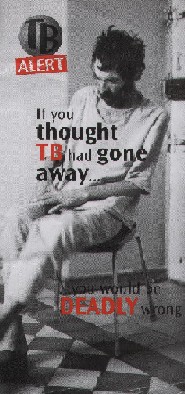|
Tuberculosis (TB)
Tuberculosis is a phenomenally important disease worldwide.
Perhaps one third (two billion) of the entire population of the world (of 6 billion) is infected with this bacterium, and many will die.
TB can be spread very easily through the so-called respiratory route (i.e. when it is present in a patient's lungs, it can be passed on to another person through coughing).
TB is particularly important where people are socially disadvantaged and poor, and therefore it has a longstanding and well-recognised association with drug use.
TB cases are usually looked after by Infectious Diseases Physicians or Chest (Respiratory) physicians and diagnosis, with major input fromn the Public Health Services, and contact tracing, investigations and treatment can sometimes be very difficult.
The "Making harm reduction work" leaflets produced by Drugscope and the Department of Health (see Custom page 2) make it clear that drug services should familiarise themselves with TB. Drug services should consider approaching local Infectious Diseases Units or Chest Units or, failing that, Microbiologists or Public Health Services to arrange appropriate training for staff.
The excellent "TB Alert" leaflet can be obtained from the charity "TB Alert" by clicking on the picture to the right. The contact details are listed below.
|
 |
How to contact "TB Alert"
The "TB Alert" leaflet is very helpful and comprehensive, and is available from:
'TB ALERT' (Stop Tuberculosis Worldwide),
22 Tiverton Road,
London NW10 3HL,
United Kingdom.
Telephone:(020)-8969-4830
Fax: (020)-8960-0069
E mail: tbalert@somhealy.demon.co.uk
Web site: http://www.tbalert.org/
The "TB Alert" web site can be accessed by clicking on the picture of the organisation's leaflet (see above).
|
|
Infections associated with drug injecting - TB and the other "usual suspects" !
Like hepatitis C, hepatitis B, hepatitis D (delta agent), HIV-1, and HIV-2, tuberculosis (TB) is epidemiologically associated with drug injecting and drug use in many parts of the world. Unlike these other infections, TB is not transmitted by the blood-borne route but rather through the inhaling of aerosols (i.e. a person catches TB by breathing in the TB germ after it has been coughed up out of the lungs of an infected person).
Because of this, it is essential that services working to help active drug users maintain a high index of suspicion for TB, particularly because it is almost always a fully treatable disease.
The need for training of staff in such units is therefore clear.
Furthermore, clinicians dealing with hepatitis C cases (e.g. infectious diseases physicians, hepatologists and paediatricians) should also maintain a high index of suspicion that TB might possibly be present. Conversely, physicians looking after TB cases (e.g. chest physicians, infectious diseases physicians and paediatricians) should be alive to the possibility of co-infection with hepatitis C and other blood-borne viruses such as HIV, and should be enquiring in to the particular epidemiological factors present in each and every case.
Action on Hepatitis C
|
|
|